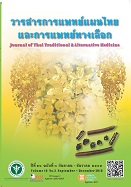Safety and Preliminary Efficacy of Herbal Formulary “N040” in Advanced Cervical Cancer: A Clinical Trial Phase 1b
Main Article Content
Abstract
Cervical cancer is the second most common cancer among Thai women. Fifteen out of 100 women will survive for 5 years or more after being diagnosed cervical cancer stage IV. Recent publications reveal that Traditional herbal formulary combined with standard treatment can increase the survival rate among patients with cancer. This study, therefore, aimed to investigate safety and preliminary effect of N040 in patients with advanced cervical cancer whom were not eligible for standard treatment. This study is a clinical trial phase 1b. Forty-four patients diagnosed with advanced cervical cancer were recruited. One capsule containing 267.50 mg. of N040 extraction was prescribed 2 times a day for 6 months. The patients were assessed every 4 weeks for 36 weeks. Baseline characteristics and blood examinations were evaluated 6 times (24 weeks). Diagnostic radiology was conducted at week 1, 12 and 36. Assessment of RECIST Criteria was compared at week 1 and 36, while quality of life scores using T-FLIC2 was compared at week 1 and 24. One-year survival rate was also performed. Statistical analysis using ratio, mean, paired t-test, Repeated One-way ANOVA and Kaplan Meier Method were calculated. Intention to treat was applied. The results showed that only 32 patients were eligible for the study. The mean age and BMI of patients were 53.31 + 10.29 years and 22.64 + 4.28 kg/m2 respectively. Percent neutrophils, Blood Urea Nitrogen (BUN) and Alkaline phosphatase (ALP) were significantly increased within the normal range after receiving N040 capsule. The RECIST Criteria showed that 20 patients (62.5%) responded to N040 medication. However, the T-FLIC 2 scores, serum level of CEA and CA19-9 were not significant different. During 1-year follow-up there were 12 deaths which represented one-year survival rate at 62.50%. No report of serious adverse event. In conclusion, this study found that N040 is safe for patients with advanced cervical cancer. About 62.5% of the patient response to the medication. However, further clinical trials with control group should be conducted to confirm the efficacy of this herbal formulary.
Article Details
References
2. Information Center on HPV and Cancer. Human papillomavirus and related diseases report: world [Internet]. 2017 [cited 2018 Feb 16]; Available from: www.hpvcentre.net/statistics/reports/XWX.pdf
3. Malini T, Manimaran RR, Arunakaran J, Aruldhas MM, Govindarajulu P. Effects of piperine on testis of albino rats. J Ethnopharmacol. 1999;64:219–25.
4. Prakash AO. Potentialities of some indigenous plants for antifertility activity. Int J Crude Drug Res. 1986;24(1):19–24.
5. Kitdamrongtham W, Manosroi A, Akazawa H, Gidado A, Stienrut P, Manosroi W, et al. Potent anti-cervical cancer activity: synergistic effects of Thai medicinal plants in recipe N040 selected from the MANOSROI III database. J Ethnopharmacol. 2013;149:288–96.
6. Paithoon O. (2013). Cervical cancer incidence in Thailand [Internet]. 2013 [cited 2018 Feb 16]; Available from: https://stri.cmu.ac.th/article_detail.php?id=17. (in Thai)
7. Scheele JS, Harder J, Stankovic Z, Räpple D, Dorn A, Spangenberg HC, et al. Clinical response to Auron Misheil therapy in a man with advanced multifocal hepatocellular carcinoma: A case report. Journal of Medical Case Reports. 2011;5:478.
8. Yang Jin Kun. 中医药治疗中晚期原发性肝癌的临床观察. Documentation for Traditional Cancer Therapy Seminar "Traditional Chinese Medicine Research Experience in Cancer Patients" Thai Traditional Medicine Research Institute. Department of Traditional Thai Medicine and Alternative Medicine. 2017. (in Thai)
9. Shen Ke Ping. 肝癌治疗概述及中医药在肝癌综合疗法中的作用. Documentation for Traditional Cancer Therapy Seminar "Traditional Chinese Medicine Research Experience in Cancer Patients" Thai Traditional Medicine Research Institute. Department of Traditional Thai Medicine and Alternative Medicine. 2017. (in Thai)
10. Greimel ER, Kuljanic Vlasic K, Waldenstrom AC, Duric VM, Jensen PT, Singer S, et al. (2006). The European Organization for Research and Treatment of Cancer (EORTC) Quality-of-Life questionnaire cervical cancer module: EORTC QLQ-CX24. Cancer. 2006;107(8):1812-22.
11. Thongprasert S, Intarapak S, Saengsawang P, Thaikla K. Reliability of the Thai-modified function living index Cancer questionnaire version 2 (T-FLIC 2) for the evaluation of quality of life in non-small cell lung cancer patients. J Med Assoc Thai. 2005;88(12):1809-15.
12. Schipper H, Levitt M. Measuring quality of life: risks and benefits. Cancer Treatment Reports; 1985;69(10):1115-23.
13. Jaroenwech C, Sindhu S, Ratinthorn A. Factors affecting the quality of life among early stage cervical cancer patients after treatment. J The Royal Thai Army Nurses. 2017;18:232–8. (in Thai)
14. Greimel ER, Winter R, Kapp KS, Haas J. Quality of life and sexual functioning after cervical cancer treatment: A long-term follow-up study. Psychooncology. 2009;18(5):476-82.
15. M Frumovitz, CC Sun, Schover LR, Munsell MF, Jhingran A, Wharton JT, et al. Quality of life and sexual functioning in cervical cancer survivors. J Clin Oncol. 2005;23(30):7428–36.
16. Uribe-Querol E, Rosales C. Neutrophils in Cancer: Two Sides of the Same Coin. J Immunol Res. 2015;2015:983698.
17. Treffers LW, Hiemstra IH, Kuijpers TW, van den Berg TK, Matlung HL. Neutrophils in cancer. Immunol Rev. 2016;273(1):312–28.

